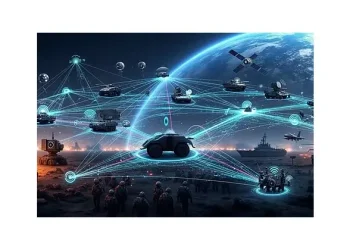Enhanced Protection of Undersea Infrastructure
The JEF, comprising ten participant nations including the UK, Denmark, Estonia, Finland, Iceland, Latvia, Lithuania, Netherlands, Norway, and Sweden, has initiated the operation dubbed “Nordic Warden.”
This initiative began in response to several incidents, including the suspected damage to an undersea power cable between Finland and Estonia on Christmas Day and four telecommunications cables in the Baltic Sea, allegedly caused by a Russian oil tanker.
Utilization of Artificial Intelligence and Surveillance
The new system employs artificial intelligence to monitor large areas of the sea and track vessels, particularly those identified as part of a “Russian shadow fleet” involved in transporting embargoed Russian oil products.
The AI-assisted computer program uses data from the Automatic Identification System (AIS) to track ship movements in real-time, sending warnings to JEF nations and the wider NATO alliance.
Economic and Security Implications
The protection of undersea infrastructure is crucial for maintaining economic stability and security in the region. Damage to these cables and pipelines can have significant economic and security implications, as seen in the recent incidents affecting Finland and Estonia.
The JEF’s actions aim to deter both deliberate acts of sabotage and cases of extreme negligence that could compromise these vital networks.
Statistics and Implementation Details
- The operation involves ships, aircraft, and personnel from multiple JEF nations operating across the North Atlantic Ocean and the Baltic Sea.
- The UK contribution includes six Royal Navy warships, a Royal Fleet Auxiliary ship, and a Royal Air Force maritime patrol aircraft.
- The JEF monitors maritime activity in 22 areas of interest, including parts of the English Channel, North Sea, Kattegat, and Baltic Sea.
Leadership Response
“The UK and JEF are leading the way in providing support to our allies to help safeguard the offshore infrastructure we all rely on against potential threats,” said John Healey, the UK Defence Secretary.
John Healey, Defence Secretary.
This statement underscores the commitment of the UK and its allies to protect critical undersea infrastructure and ensure regional stability.
Progress and Future Developments
- The JEF has intensified its cooperation and focus on protecting Critical Undersea Infrastructure (CUI) through operations like Nordic Warden, which follows similar activities at the end of 2023.
- NATO has established a Critical Undersea Infrastructure Coordination Cell at NATO Headquarters to facilitate engagement with industry and key stakeholders.
- The JEF aims to continue deepening surveillance around offshore assets and sharing intelligence to enhance security.
Regional Impact
The operation has significant implications for the security and prosperity of nations in Northern Europe.
For instance, Finland and Estonia have faced direct economic and security consequences from the damage to undersea cables, highlighting the risks to vital communication and energy networks.
The JEF’s actions are crucial in supporting these nations and maintaining regional stability.
Immediate Implications
The activation of the UK-led reaction system marks a significant step in enhancing the security of undersea infrastructure.
This move is expected to improve the detection and interdiction of suspicious activities, thereby protecting critical energy and communication routes.
Broader Significance
The JEF’s efforts reflect a broader strategy to combat hybrid threats and ensure the security of critical national infrastructure.
This collaborative approach among NATO allies demonstrates a strong commitment to maintaining peace, security, and the rules-based international order in the face of emerging challenges.









